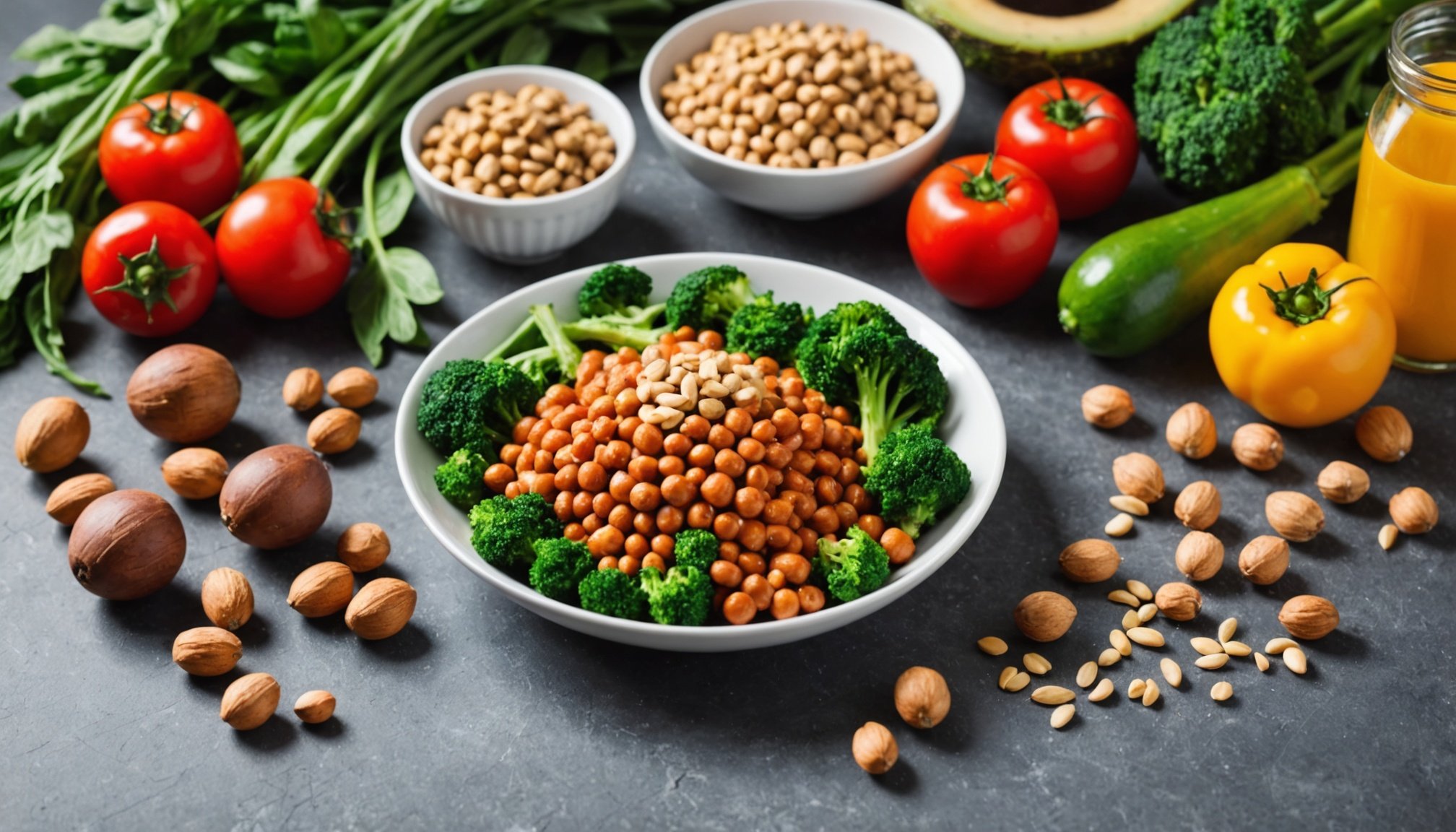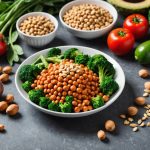Overview of Top Plant-Based Protein Sources
Understanding the role of protein in strength training is crucial for those aiming to build and maintain muscle mass. Protein serves as a building block for muscle tissue, helping repair and grow muscles after workouts. When considering plant-based protein sources, it’s key to distinguish between plant and animal proteins. While animal proteins are often considered complete due to containing all essential amino acids, plant-based protein can also support strength training effectively.
The rise of vegetarian protein options has provided varied and rich sources for athletes. Legumes such as lentils and chickpeas offer substantial protein content, along with beans and peas, providing essential nutrients without the animal fats. For those on a vegetarian or vegan diet, incorporating a variety of such sources ensures a wide range of amino acids. Additionally, soy products like tofu and tempeh are excellent substitutes for meat, delivering high protein levels while being low in fat.
In the same genre : Exploring the Lasting Impact of Stability Balls on Core Training Exercises
Embracing a vegetarian diet isn’t just about replacing meat but adopting a broader spectrum of foods. Besides bolstering strength training, these diets often lead to improved digestion, better overall health, and fewer concerns about cholesterol. By focusing on diverse plant-based sources, individuals can fuel their strength goals robustly.
Comprehensive List of High-Protein Plant Foods
When it comes to high-protein plant foods, vegetarian protein sources offer a diverse array to meet nutritional needs.
Also to see : How to Effectively Restore Balance Between Quadriceps and Hamstring Strength: A Step-by-Step Guide
Legumes
Legumes like lentils, chickpeas, and beans are excellent vegetarian protein sources. For example, cooked lentils provide around 18 grams of protein per cup, making them a staple in any plant protein list. These nutritional powerhouses also offer fibre, iron, and B vitamins. Incorporate legumes into your meals by adding them to soups, stews, or salads. They also make a perfect base for veggie burgers or meatless meatballs, providing a satisfying texture and flavour.
Grains and Seeds
Protein-rich grains such as quinoa, farro, and amaranth are fantastic additions to a vegetarian diet. Quinoa stands out, boasting 8 grams of protein per cup cooked. Meanwhile, seeds like chia, hemp, and pumpkin are not only packed with protein but also offer healthy fats, fibre, and various micronutrients. Sprinkle seeds on your morning yoghurt or blend them into smoothies. Grains can be used as a base for bowls or pilafs, enhancing the meal’s nutritional profile and keeping you full longer.
Nuts and Nut Butters
Nuts, including almonds, walnuts, and cashews, are convenient protein sources, with almonds containing about 6 grams per ounce. Nut butters, like almond or peanut, provide concentrated nutrition, healthy fats, and economic versatility. Use nut butters in dressings, smoothies, or as a spread to add a protein boost to your snacks and meals.
Nutritional Benefits of Plant-Based Proteins
Plant-based proteins offer a host of nutritional benefits that can significantly contribute to overall well-being. These proteins have diverse amino acid profiles, crucial for muscle repair and recovery. While they often contain lower levels of certain essential amino acids compared to animal proteins, combining different plant sources can provide a complete protein profile, ensuring you receive all the amino acids your body needs.
Moreover, the health benefits of a plant-based diet extend beyond amino acid intake. Such diets are associated with improved heart health, partially due to their lower saturated fat content and higher fiber levels. These characteristics can help manage weight and reduce the risk of cardiovascular disease. For example, legumes, quinoa, and tofu are advantageous plant proteins known for promoting heart health.
Additionally, plant proteins play a pivotal role in recovery and muscle repair, especially post-exercise. They are often easier to digest and less inflammatory than animal proteins, making them suitable for individuals with sensitive digestive systems or those looking to minimize inflammation in recovery processes. Overall, incorporating varied plant protein sources into your dietary regimen can help achieve a balanced and nutritious diet, reaping the multitude of associated health benefits.
Preparation Tips for Plant-Based Proteins
Optimising the retention and flavour of plant-based proteins during meal prep is key. Start by focusing on the best cooking methods. Steaming and baking are excellent choices, as they preserve essential nutrients better than frying or boiling. Consider steaming tofu or baking chickpeas to maintain their structural integrity and protein content.
To enhance flavour, think outside the box. Marinating is a time-tested technique that infuses your plant proteins with taste. Use citrus, herbs, or soy sauce for tofu and tempeh. For lentils or beans, experimenting with spices like cumin, paprika, or turmeric can elevate their natural flavours. Don’t shy away from experimenting with different cuisine styles, whether it’s a spicy Mexican bean mix or an Italian herb-infused tofu.
Consider meal prepping strategies effective for strength training. Include a variety of plant-based proteins such as legumes, nuts, and seeds alongside your greens and grains. Remember to batch cook to save time, yet maintain diversity to avoid monotony. Prepping dishes like quinoa salad with roasted chickpeas or lentil curries ensures a steady supply of protein-rich meals tailored to your fitness goals without compromising on taste.
Incorporating Plant Proteins into Strength Training Regimens
Transitioning into a vegetarian workout diet can be seamless and rewarding. Understanding and incorporating protein is crucial for optimal strength training nutrition.
Daily Protein Recommendations
Understanding your daily protein needs is fundamental. For those following a vegetarian diet, it’s important to ensure adequate intake. The common guideline suggests 1.2 to 2.0 grams of protein per kilogram of body weight, tailoring it to your fitness level and goals. Measuring protein intake can be facilitated by using nutrition apps or food diaries, helping you track each meal’s contribution to your daily goal.
A well-structured strength training nutrition plan includes diverse protein sources like beans, lentils, tofu, and nuts. Consider these sample meals: a breakfast of oatmeal with peanut butter and chia seeds; a lunch of quinoa salad with chickpeas and mixed greens; and a dinner featuring a tempeh stir-fry with vegetables and brown rice.
Meal Planning for Strength Training
Creating balanced meals involves pairing plant proteins with complex carbohydrates and healthy fats. Consider the timing of your protein intake: consume it pre-workout for sustained energy and post-workout for muscle recovery. Suggested meals include a pre-workout snack of almond butter and banana, and a post-workout meal of lentil soup and whole grain bread.
Recipes Featuring Plant-Based Proteins
For quick and easy protein-rich recipes, try overnight oats with soy milk and berries for breakfast, a chickpea wrap for lunch, and a tofu stir-fry for dinner. Snacks like hummus with veggies or protein smoothies provide on-the-go energy, supporting your vegetarian workout diet without compromise.
Expert Recommendations and Comparisons
Understanding protein intake is crucial, especially for vegetarians who must carefully select their sources. Nutritionists emphasize that a diverse mix of plant-based diets can effectively meet protein needs. Common plant proteins include beans, lentils, tofu, and quinoa. These are naturally high in essential amino acids, vital for building and repairing body tissues.
When comparing plant proteins to animal-based proteins, it’s important to note that animal proteins often contain all essential amino acids. In contrast, most plant proteins other than quinoa and soy may need to be complemented with other food sources. For instance, combining beans and rice can ensure you’re getting a complete amino acid profile.
Experts often provide specific protein recommendations for vegetarians. They suggest incorporating a variety of proteins from different sources to balance nutrient intake. Additionally, they advise considering supplements or fortified foods, especially vitamin B12, iron, and omega-3 fatty acids, which are predominantly found in animal products. These can help bridge dietary gaps and maintain optimal health.
By following expert advice and making informed comparisons of protein sources, vegetarians can ensure they meet their daily protein requirements effectively and enjoyably.










